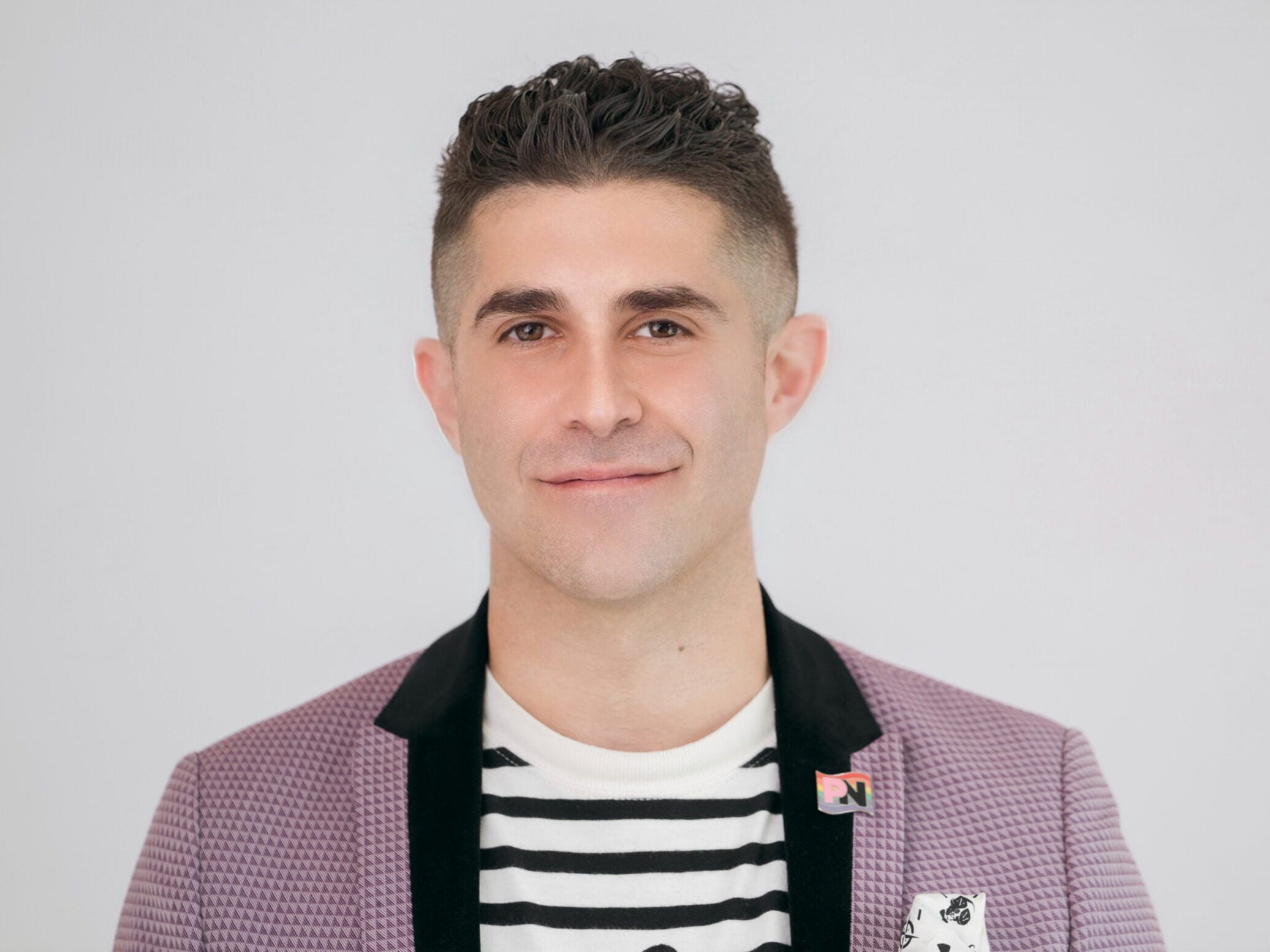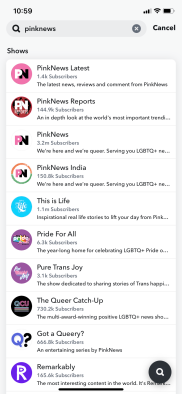
Pink News started as a side hustle for founder Benjamin Cohen and is now a global brand boasting £2m annual profit. Here he offers lessons for other publishers on how the LGBTQ+ brand reaches a Gen Z audience (those born between 1997 and 2012).
Speaking to Press Gazette’s Future of Media Explained podcast, Pink News chief executive Cohen credited a mixture of factors for helping to reach today’s teens and those in their early 20s including: a fruitful partnership with Snapchat Discover, a mission and focus on issues that “resonate” with that age group, a team weighted towards Gen Z and younger millennial staff, and a “fun, nurturing” internal culture.
Cohen said the Pink News mission is “to inform, inspire change and empower people to be themselves”.
“That mission runs through everything we do when it comes to the content, the advertising partnerships we have and the platform partnerships that we maintain,” he added, “and I believe that that sort of mission really resonates with Gen Z and young millennials. They’re a generation that have really core, key, important values.”
Cohen believes Pink News has an important purpose among Gen Z audiences because of the “current climate” in which LGBTQ+ people, and trans and non-binary people in particular, are attacked elsewhere in the media.
He said the brand wants to “counter that narrative” and be a “voice that stands up for them” by creating content through a certain lens – and that this applies to LGBTQ+ people, their friends and families, and straight allies, many of whom in that generation share the same “core values”.
Many publishers focus on their social media use when talking about Gen Z. In particular this year there has been a major industry-wide push on Tiktok.
But Cohen shared a number of concerns about the platform: that its users are not just Gen Z and it is a mistake to treat them as such, that its only real form of monetisation is by selling branded content, that it feels like a less safe space than some of its competitors because of its content rules, and that its Chinese ownership structure poses questions about potential investment in it.
He said: “I feel like there are legitimate questions for that platform and whether it’s right to be investing significantly in that, which are questions we just don’t see with Snap, Twitter, Facebook instead.”
In particular, he added, it is less worthwhile to experiment on Tiktok for a small publisher that needs quicker payoffs. Pink News has doubled its team from 30 to 60 in the past year, is planning to hire another 15 to 20 people this year and a further 100 next year.
“So we are rapidly growing, but we are not as big as the Daily Mail or The Telegraph or Vice, other places which are putting significant resources, I think, into platforms like Tiktok,” Cohen said.
“And so for us, we do look at where we’re likely to get the clearest return on investment,” he added, although he did say there is advertiser demand for Pink News branded content on Tiktok and they are putting some investment into the platform.

Pink News Snapchat channels
Cohen instead favours Snapchat, on which Pink News became the first LGBTQ+ publisher in 2018 and for which he said he would “always be a cheerleader”.
Cohen said Pink News has seen a total revenue growth of 300% year-on-year every year since joining Discover and that he has been pleased with Snapchat’s advertising monetisation potential which has seen “continual growth”.
Pink News now has a team of nearly 20 people creating content for six million (non-deduplicated) subscribers to 20 Snapchat channels covering genres like LGBTQ+ news, positive news, celebrity and fashion.
Pink News’ shows appear on Snapchat Discover, the professional news and entertainment section of the app for which only a limited number of publishers have deals to appear.
Discover launched in 2015 with a limited set of media partners including ESPN, CNN and Vice and Cohen said he spent years lobbying for a deal with Snapchat. In total 17 UK publishers joined Discover in 2018, with Sky News, Ladbible, The Guardian and Cosmopolitan UK on board alongside Pink News.
Cohen said “we were blown away by how many people we reached immediately” and that the engagement on the platform and “creative way” of telling stories that it requires has informed Pink News content across all other platforms as well.
According to a blog from social media management platform Hootsuite, 39% of the advertising audience on Snapchat is aged 18 to 24. The second biggest age groups are 25 to 34, then 13 to 17.
The second biggest platform for Pink News is Facebook, which delivers about half of its website traffic, but Cohen said that following the brand on that platform and liking its content is “akin to coming out” as it is shared in other people’s feeds, meaning for young audiences and others who are coming to terms with their identities “a platform like Facebook actually isn’t necessarily the right one to be on”.
On the other hand sister Meta platform Instagram is good for a “more curated discussion. It’s a very friendly community,” Cohen said, although he added that its monetisation options are not currently as good as Facebook.
Twitter also brings in “significant revenue” as Pink News has a video partnership meaning brands buy advertising on its Twitter videos.
But of Tiktok, Cohen said: “Any media company that looks at it and thinks that that’s the Gen Z platform is actually slightly mistaken. Yes, there’s lots of Gen Z using it, but there’s people of all generations using it and I think it’s wrong to pigeonhole that as a Gen Z only platform.
“The challenge for us for Tiktok is… monetisation is not the same as on Snap or on Facebook or Twitter. There isn’t really much monetisation unless you’re selling branded content so the revenue that we earn from creating video content on some of those other platforms just doesn’t happen on Tiktok.
“Plus it’s not a curated platform, so with something like Snap there’s an algorithm at play, of course, but there’s also a really clear content strategy, there’s a limited number of publishers and it allows our content to shine. There’s really clear and strict content rules that aren’t in place on other platforms such as Tiktok. So it doesn’t feel sometimes as safe a space.”
Cohen was speaking shortly after Parliament's short-lived Tiktok account was shut down due to concerns over its Chinese ownership and said "that does raise questions about investment into that platform".
Asked for advice to other media bosses hoping to capture that coveted Gen Z and young millennial audience, 40-year-old Cohen said the main thing is to "hire more of them".
"There's some amazing talent that's out there," he said. "What we've tried to do internally at Pink News is create a really fun, nurturing environment for people to work in. What we've massively invested in in the last 12 months is our internal culture and that's so important, particularly for young generations."
He added that this includes a monthly Pride of Pink News Awards for junior employees, a quarterly round-up of achievements and a party, and creating an environment where hard work gets done but staff also have fun.
He added that CEOs then need to make sure they "listen to the team", saying Pink News does regular surveys of staff about both the working environment and what they think about the content being created.
"...things that I thought we would never do we're doing because people really wanted it and we want to create the best environment for them," Cohen said.
"And we've changed some of the things that we're doing from a content perspective because we've listened to our team and listened to the audience and realised that actually the things that we thought were right weren't right, and you have to continually be evolving your offering.
"And it's because of that Pink News has achieved that 300% revenue growth year-on-year and achieved the really significant growth and profits that we've managed to accumulate that's allowed us to invest in growing our team so substantially this year."
Pink News has grown profits by 444% since Covid-hit 2020, with operating profit up from £370,630 to £2m in 2021.
Listen to Press Gazette's Future of Media Explained podcast to hear more from Cohen about Pink News' Snapchat Discover partnership, why his brand resonates with Gen Z audiences and more tips for publishers.
Picture: Pink News
Email pged@pressgazette.co.uk to point out mistakes, provide story tips or send in a letter for publication on our "Letters Page" blog
